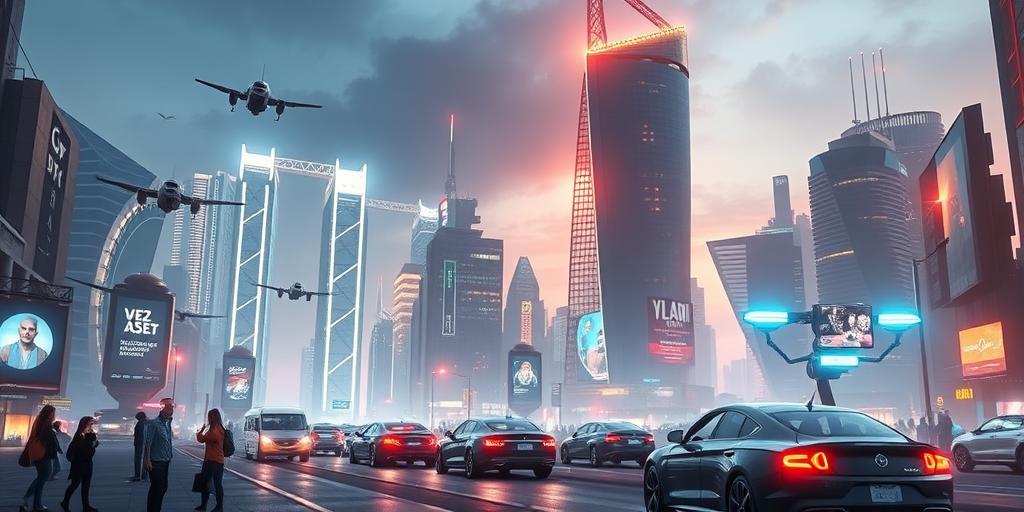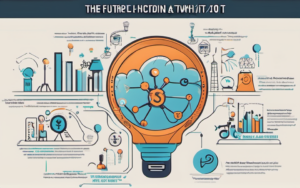Emerging technologies are rapidly changing the way we live, work, and interact with the world around us. From the smartphones in our pockets to the smart homes we inhabit, technology is seamlessly woven into the fabric of our daily lives. This transformative power is fueled by a constant stream of advancements in fields like artificial intelligence, the Internet of Things, virtual and augmented reality, and blockchain technology.
The Transformative Power of Emerging Technologies
Emerging technologies are not simply cool gadgets or futuristic concepts; they have the potential to solve some of the world’s most pressing challenges and create a brighter future for all. Let’s explore some of the key areas where these technologies are making a tangible impact.
Revolutionizing Communication and Connectivity
The rise of social media platforms, instant messaging apps, and video conferencing tools has revolutionized the way we communicate. We can now connect with friends and family across the globe in real-time, regardless of distance. The internet has become an indispensable tool for information sharing, education, and collaboration. Emerging technologies are further enhancing connectivity with advancements like 5G networks, which promise even faster speeds and lower latency, paving the way for seamless communication and immersive experiences.
Redefining Healthcare and Wellness
Emerging technologies are transforming the healthcare industry, improving diagnostics, treatment options, and patient care. Telemedicine platforms allow patients to consult with doctors remotely, while wearable devices monitor vital signs and provide personalized health insights. Artificial intelligence is playing a crucial role in drug discovery, personalized medicine, and disease prediction. These advancements are leading to a more proactive and preventative approach to healthcare, ultimately improving our well-being.
Shaping the Future of Education and Learning
Emerging technologies are democratizing access to education and creating personalized learning experiences. Online learning platforms offer a wide range of courses and resources, while virtual reality simulations provide immersive learning environments. AI-powered tutors can provide personalized feedback and support, catering to individual learning styles and needs. The future of education is likely to be more interactive, engaging, and accessible than ever before.
Transforming Industries and Workplaces
Emerging technologies are transforming industries across the board, from manufacturing and agriculture to finance and retail. Automation and robotics are increasing efficiency and productivity, while data analytics and machine learning are helping businesses make better decisions. The rise of the gig economy and remote work opportunities is changing the way we work and creating new opportunities for individuals.
Artificial Intelligence: The Intelligent Assistant
Artificial intelligence (AI) is one of the most transformative emerging technologies, with the potential to revolutionize countless aspects of our lives. AI systems are capable of learning from data, making predictions, and even performing tasks that traditionally required human intelligence.
AI in Everyday Applications
AI is already present in many aspects of our daily lives. From personalized recommendations on streaming platforms to voice assistants like Siri and Alexa, AI is constantly learning and adapting to our preferences. AI-powered navigation apps guide us through traffic, while spam filters protect us from unwanted emails.
AI-Powered Personalization and Automation
AI is enabling a new era of personalization and automation. AI algorithms can analyze vast amounts of data to tailor products and services to individual needs and preferences. In the workplace, AI is automating repetitive tasks, freeing up human workers to focus on more creative and strategic endeavors.
Ethical Considerations and the Future of AI
As AI becomes increasingly sophisticated, it is crucial to address the ethical considerations surrounding its development and deployment. Issues like bias in algorithms, job displacement, and the potential for misuse of AI require careful consideration and responsible innovation.
The Internet of Things: Connecting the Physical and Digital Worlds
The Internet of Things (IoT) refers to the network of interconnected devices that collect and exchange data. From smart home appliances to wearable fitness trackers, IoT devices are rapidly transforming our lives by connecting the physical and digital worlds.
Smart Homes and Connected Devices
IoT devices are making our homes more comfortable, efficient, and secure. Smart thermostats can adjust temperature automatically, while smart locks can be controlled remotely. Connected appliances can be monitored and controlled from smartphones, streamlining household tasks.
IoT in Healthcare and Industry
IoT is revolutionizing healthcare by enabling remote patient monitoring, wearable health trackers, and smart medical devices. In industry, IoT sensors are used to optimize manufacturing processes, monitor equipment performance, and ensure safety.
Security and Privacy Concerns in the IoT Era
The proliferation of connected devices raises concerns about security and privacy. It is crucial to ensure that IoT devices are secure from hacking and data breaches. Ethical considerations related to data collection and usage must also be addressed.
Virtual and Augmented Reality: Immersive Experiences
Virtual reality (VR) and augmented reality (AR) are immersive technologies that are blurring the lines between the physical and digital worlds. VR creates immersive experiences by transporting users to virtual environments, while AR overlays digital information onto the real world.
VR and AR in Entertainment and Gaming
VR and AR are revolutionizing the entertainment and gaming industries. VR headsets offer immersive gaming experiences, while AR games like Pokémon Go bring virtual characters into the real world.
Applications in Education, Training, and Healthcare
VR and AR are finding applications in education, training, and healthcare. VR simulations provide realistic training environments for surgeons, pilots, and other professionals. AR can be used to overlay anatomical information on patients during surgery.
The Potential of VR and AR for Social Interaction
VR and AR have the potential to revolutionize social interaction. Virtual worlds can provide opportunities for social connection and collaboration, even for people who are geographically isolated.
Blockchain Technology: Decentralized Trust and Transparency
Blockchain technology is a decentralized, secure, and transparent ledger that records transactions across a network of computers. It has the potential to revolutionize various industries, from finance to supply chain management.
Cryptocurrencies and Digital Assets
Blockchain technology is the foundation for cryptocurrencies like Bitcoin and Ethereum. These digital currencies offer a decentralized alternative to traditional fiat currencies.
Blockchain in Supply Chain Management and Finance
Blockchain can improve transparency and efficiency in supply chain management by tracking goods from origin to destination. In finance, blockchain can streamline transactions, reduce costs, and enhance security.
The Future of Blockchain and its Impact on Society
Blockchain technology has the potential to transform various aspects of society, from voting systems to identity management. Its decentralized and secure nature offers a new paradigm for trust and transparency.
Navigating the Future: Challenges and Opportunities
The rapid advancement of emerging technologies presents both challenges and opportunities. It is crucial to navigate this landscape responsibly, ensuring that these technologies are used for the betterment of humanity.
Ethical Considerations and Responsible Innovation
As emerging technologies become more powerful, it is essential to address ethical considerations related to data privacy, algorithmic bias, and the potential for misuse. Responsible innovation is key to ensuring that these technologies are used for good.
The Impact on Employment and the Workforce
Automation and AI are transforming the workforce, leading to job displacement in some sectors. It is crucial to invest in education and training programs to prepare workers for the jobs of the future.
The Importance of Digital Literacy and Adaptability
In a technology-driven world, digital literacy is essential for individuals to thrive. It is crucial to foster a culture of lifelong learning and adaptability, enabling people to embrace new technologies and adapt to changing job markets.
Embracing the Future of Technology
Emerging technologies are shaping the future of our world, creating new opportunities and challenges. It is crucial to embrace these advancements while remaining mindful of the ethical implications and potential consequences. By fostering collaboration, promoting innovation, and investing in education and training, we can harness the power of emerging technologies to build a brighter future for all.




